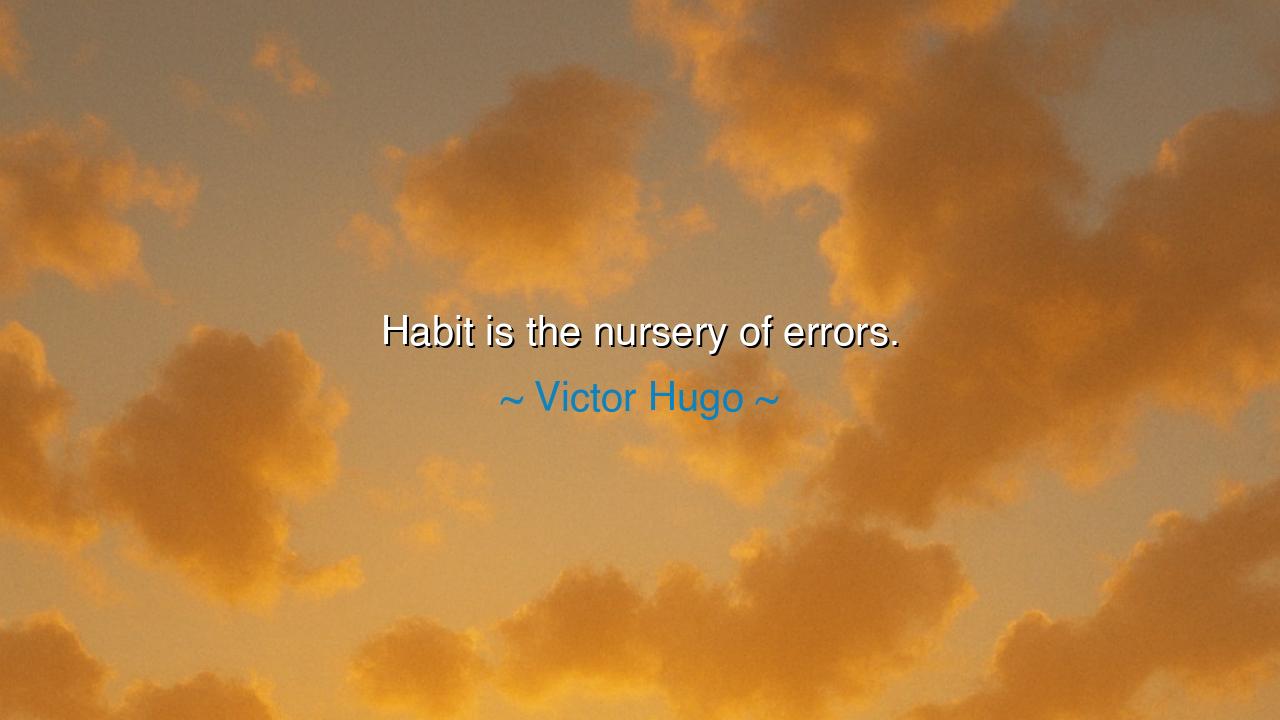
Habit is the nursery of errors.






Habit is a double-edged force: it can shape greatness, but it can also breed ruin. When Victor Hugo, the towering voice of French literature, declared, “Habit is the nursery of errors,” he revealed a profound truth about the human spirit. Habits, formed through repetition, can lull the mind into blindness. They provide comfort and ease, but they also create ruts so deep that one ceases to question or reflect. In this way, habit becomes a nursery, nurturing small mistakes until they grow into mighty forces of destruction.
At the heart of Hugo’s wisdom lies the danger of unconscious living. When people act merely because “this is how it has always been done,” they surrender their freedom to think and choose. The first mistake may seem small—a careless decision, a false belief, a moment of neglect. But repeated day after day, it grows roots deep within the soul. Over time, these small errors, shielded by the comfort of habit, become powerful enough to shape destinies. What began as a single misstep becomes a way of life, leading individuals, families, and even nations toward disaster.
History provides countless examples of this truth. Consider the decaying French aristocracy before the Revolution. For generations, the ruling class had lived in luxury and excess, clinging to traditions and privileges without questioning their morality. Their lavish feasts, oppressive taxes, and indifference to the suffering of the common people were not born overnight—they were habits, cultivated over centuries. These habits blinded them to the storm that was gathering, and by the time they recognized their errors, the fires of revolution had already consumed their world.
On a personal level, habits can shape the inner life just as powerfully. The philosopher Aristotle once said, “We are what we repeatedly do.” This truth is both inspiring and terrifying. Good habits, like daily reflection, kindness, or discipline, can elevate a person toward wisdom. But harmful habits—anger, greed, deceit—become invisible chains. A person who lies once feels shame; a person who lies daily feels nothing, for the error has been normalized. This is the nursery Hugo warns against: a space where wrongdoing is fed until it grows too strong to resist.
Hugo’s own life and works reflect his awareness of this danger. In his masterpiece Les Misérables, he depicts characters such as Javert, whose rigid adherence to rules becomes a destructive habit. Javert’s inability to see beyond the law blinds him to mercy and compassion, leading to tragedy. Through such characters, Hugo shows how even virtues, when hardened into unquestioned habits, can turn into errors that destroy both the individual and those around them.
Let this lesson echo through the ages: question the habits that govern your life. Comfort and repetition may feel safe, but they can also conceal the growth of error. As Victor Hugo teaches, we must live with awareness, constantly examining our choices and actions. For habits are powerful soil, and what we plant there—whether seeds of truth or seeds of error—will grow to shape the destiny of our lives and the world itself.






B1Kim Khanh b 11.8
Victor Hugo seems to be warning us against the dangers of routine, but I wonder if this applies universally. Are all habits inherently bad, or do they only become problematic when we stop challenging them? For example, could certain habits—like healthy eating or exercise—become positive routines that don’t lead to errors? I think it might be about being conscious of which habits we foster, rather than avoiding them altogether.
MTDam Thi Minh Thu
This idea really resonates with me, especially in a world where habits can become so automatic. It raises the question: is it always better to break free from habits, or are some essential for stability? How do we avoid falling into the trap of automatic behavior that blinds us to opportunities for improvement or learning? Maybe the key is in cultivating awareness while sticking to useful habits.
Cchampinon
Hugo’s quote makes me reflect on how habits can sometimes cause us to repeat mistakes without realizing it. But is there a way to have habits that encourage growth, rather than errors? Can a person still cultivate productive habits without falling into the trap of complacency? I’m curious if habit itself is inherently bad, or if it’s the lack of awareness or reflection on those habits that leads to error.
HPNguyen Thi Hong Phuong
I find this quote really thought-provoking. It seems to suggest that when we fall into the comfort of routine, we stop questioning our actions, which can lead to mistakes. But isn’t habit also what helps us function efficiently in our daily lives? Can we really avoid all errors just by breaking habits, or is there a balance between helpful routines and stagnation that we need to find?